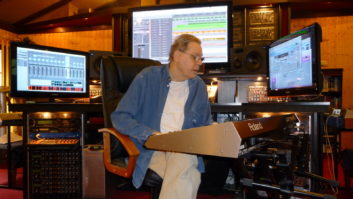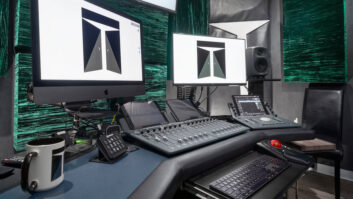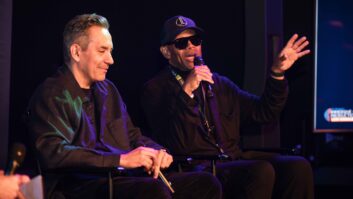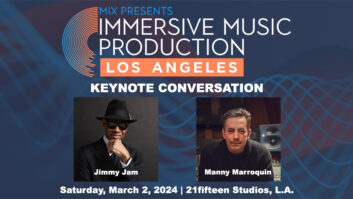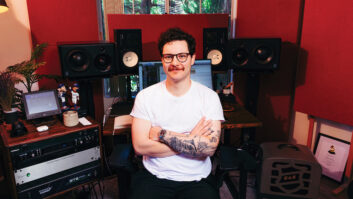This spring, The Raveonettes released Atomized—the band’s ‘anti-album’ that consisted of 12 songs recorded and released each month over the course of 2016. For songwriter/multi-instrumentalist/vocalist Sune Rose Wagner, it was an inspiring way to construct the album, particularly since he is a ‘writer’s writer’ who thrives on deadlines.
While the work is instantly recognizable as a Raveonettes collection, the songs are fresh, cohesive and engaging—reflecting the work of a master songwriter/producer at the peak of his creativity. When Pro Sound News spoke with Wagner, it was immediately clear he is not about to slow down and is more passionate than ever about pursuing his craft.
ON THE ‘SONG OF THE MONTH’ CONSTRUCT:
Doing a song a month was fun, and knowing that I had to finish a song by a certain date was good because I work well with deadlines. I didn’t spend a month writing a song; I would spend a day or two writing before deadline. I go through the whole month and just soak up inspiration, and when it comes time to write, it comes really easily for me because I’ve had a month to subconsciously think about what I want to do. I actually thought the songs were not going to be so coherent when they were put together and I was anticipating a very strange album going in 12 different directions. But even though the songs are all different, they all go together really well, and that surprised me in a positive way. I guess it means that whatever I write, I still leave my signature on it somehow, whether it is an instrumental song, an electronic song, or a noisy song.
ON WRITER’S BLOCK:
Songwriting has always been really easy for me. I’ve never had writer’s block, and have never had difficulty finding inspiration. To be honest, I don’t really understand writers block because I think work is work. If you are a writer, you write; that’s what you do. If you don’t write, then you are not going to be good at it. This is just how it is. I write every day, and many times I don’t like the result, but I do it because that’s what I do. If you want to call yourself a writer or a songwriter, then that’s what you do in life. You write, and that’s it.
ON HOME RECORDING:
I’ve had a home studio for most of our career and have done everything at home. I have all the gear that I think is appropriate for what I do, and I use a hybrid of in-the-box and outboard gear. Obviously, I like the idea of being in-the-box because of portability and easy recall. My vocal chain is always the same: I go in through a Chandler TG2-500, then I have an API 550A 500 series equalizer and then finally through my 1176. That chain never changes and is always hardwired. My microphone choice depends on the song, but I use a lot of vintage Altec mics. These are good for my voice because I don’t usually need the whole dynamic range—I tend to hi-pass lopass a lot anyway.
ON JAZZMASTER AFFINITY:
I had a band back in the ’90s in Denmark called Psyched Up Janis. We did all our albums with this producer, Craig Leon, who was responsible for the first Ramones album, Blondie and Suicide—he worked on all these albums which I consider absolute classics. One day, he told me that on my next album, I should probably consider using a Jazzmaster, because he thought I would like it. He found a 1961 Jazzmaster for me, which unfortunately got stolen with all our gear, but now I have a 1963 Jazzmaster that I really love. We’ve never used amps or miked cabinets on the Raveonettes—all the guitars are always going straight into the box. For recording, after going into my pedal chain, I will go into a Shadow Hills Gama preamp; then that goes into a Crane Song Falcon Tube compressor and then finally through the interface.
ON OVERCOMING PRECONCEPTIONS:
We are like 17 years into this now. The down side of that is that people think they know what you stand for and what you do, because they might have heard a Raveonettes song five years ago. But they might not realize that we always do very different stuff, and that is a little bit of a bummer—some radio blogger is going to have a preconception. That is why I try to focus a lot on writing for other people now. Even if I have a beautiful song, oftentimes it is not a Raveonettes song, because I know no one will hear it. So I give it to someone so it can get out there.
ON THEN AND NOW:
When I was younger, I wanted to be in a band. I wanted to write music for the band and play shows and all that. Now, my main priority is not to be in a band. I am just comfortable where I am in this band and we can do whatever. If we want to tour next month, we’ll tour next month. If we want to do an album next month, we’ll do it. The freedom is there, but I am more excited about writing for other people and that’s where my future is. Because I am a songwriter, I can never get tired of that, because it is all about songs and production and that’s what I have always been into. So whenever I hear a new track, like The Weeknd, or Beyonce, or whatever, I get super excited. I sit down, listen to it with headphones, I take notes, I say, ‘Oh my god, that’s a great idea’ when I hear a new synth line or whatever. I don’t think I’ll ever stop doing that, and there is always something new to learn.
Jacques Sonyieux is a devout explorer of recording studios and the artists that occasionally inhabit them. Please send any tips or feedback to Jacques at: [email protected].
